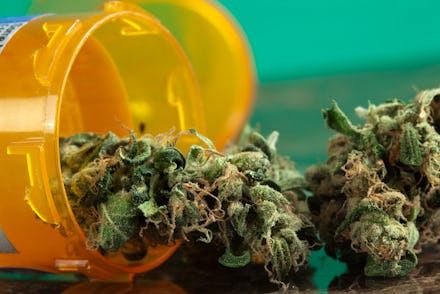Can cannabis actually treat mental illness? Scientists need more proof

As cannabis use becomes more widely accepted, the wellness world has zoomed in on the potential healing properties of a class of compounds in the plant known as cannabinoids, including, most notably, tetrahydrocannabinol (THC) and cannabidiol (CBD). CBD in particular has been touted as a “calming” compound with the potential to alleviate a host of mental health conditions, including anxiety and depression. But according to research published in The Lancet Psychiatry on October 28, we still don’t know enough about the function of cannabis to treat mental health conditions, which means the risks of doing so may outweigh the benefits.
The review and meta-analysis looked at published and unpublished or ongoing studies of the use of medicinal cannabinoids to treat adults for depressive disorders, anxiety disorders, attention-deficit hyperactivity disorder (ADHD), post-traumatic stress disorder (PTSD), Tourette syndrome, or psychosis, between 1980 and 2018. The final analysis included 83 of those studies, 40 of which were randomized controlled trials, which researchers consider the ideal study design for evaluating health interventions, VICE reports.
Pharmaceutical-grade THC improved anxiety symptoms — but in studies that looked at using cannabinoids primarily for other medical conditions such as multiple sclerosis and chronic pain. This is a major limitation, as TIME points out. Sure, the cannabinoids might have directly improved the anxiety symptoms — but it’s also possible that the they relieved participants’ chronic pain, which, in turn, lowered their anxiety levels.
Other findings also challenged the popular narrative of cannabis as a miracle drug. Pharmaceutical-grade THC didn’t lead to significant improvements in the primary outcomes of the mental health conditions examined, but they did increase the number of participants who suffered from adverse events, or had to withdraw from studies because of adverse events. And in one study, pharmaceutical-grade THC actually worsened psychosis symptoms.
What’s more, the typical weed user isn’t using pharmaceutical-grade cannabinoids, TIME reports, yet the authors of the review and meta-analysis wrote that several studies suggest that non-medicinal cannabis can, in fact, exacerbate mental health symptoms. Ultimately, they concluded that there is “scarce evidence” to suggest that cannabinoids improve the symptoms of the mental health conditions they examined.
That doesn’t mean weed has zero benefits for mental health, as VICE notes, but rather, that at this point, we don’t know enough to say one way or the other. The authors of the review and meta-analysis themselves urge “further high-quality studies directly examining the effect of cannabinoids on treating mental disorders.” Cannabis is a Schedule 1 drug, the most strictly regulated category of controlled substances subject to federal regulation, making it challenging for scientists to pursue research on it — but the lack of funding for such studies from companies and states profiting from cannabis sales poses an even bigger hurdle, according to VICE.
So while the wellness industry may push cannabis products as mental health cure-alls, the reality is, until scientists conduct more appropriately-designed studies, we have no clue whether using them to treat mental health conditions will help — or do harm. If you do have depression or an anxiety disorder, it’s probably best to see a mental health professional and stick to approaches for which we already have plenty of evidence.